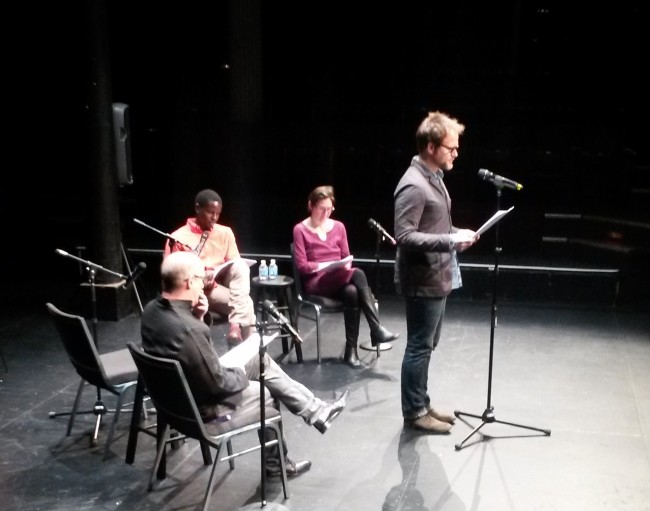I attended the Translation Slam on May 2nd, which was an event during the PEN World Voices Festival at The Public Theater on Lafayette Street. Our advisor Emmanuelle Ertel had been asked to participate, as well as a student at Columbia University whose teacher is also our teacher (Alyson Waters) for our Translation Workshop this semester. It wasn’t supposed to be a competition (like the title suggests), but more of a comparison and discussion of two translator’s work on the same piece.
The author, Todd Colby, read his work first: “How to Look Like Everything is Okay in Photographs”. Then Baba Badji (the student from Columbia University) read his translation of it from English into French, and Emmanuelle Ertel read hers last.
Here are some differences that I found interesting between the two translations:
– Baba’s title was “Comment feindre le bien-être en photographie” and Emmanuelle’s was “Comment prétendre que tout va bien dans une photographie”
– They translated your house as « ta maison » (Baba), and « ta demeure » (Emmanuelle). Emmanuelle managed to create an internal rhyme with hers, but Baba stuck with the simple and general word.
– Colby had a term that he created, no fuck zone. Baba translated it as “zone sans baise” and Emmanuelle chose “zone hors sexe”.
– Colby had a unique description of plush degenerative offal gush. Baba translated it as “un somptueux odeur de déluges” and Emmanuelle wrote « le flot feutré d’ordures en décomposition ».
– Colby had written to discover someone is looking back at you from the adjoining building. Baba wrote as “découvrir que quelqu’un te regarde, toi, de l’immeuble voisin” and Emmanuelle translated it as « t’apercevoir que quelqu’un te renvoies ton regard de l’immeuble voisin ».
– And for the last line, they both translated it in the same way. When you ate your breakfast this morning did you think of me? Quand tu as pris ton petit-déjeuner ce matin, as-tu pensé à moi?
There was also a translation of a piece from Danish into English- and while I don’t understand Danish, it was interesting to see the differences between the English translations. The whole event was also videotaped, and you can watch it here.





